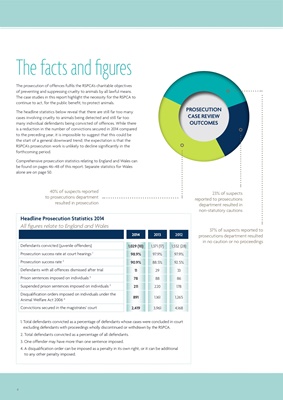
Contents
The facts and figures 4
County case studies 6-38
Dealing with difficult people 10-11
NekNomination 16-17
From rags to riches 22-23
Deprived dogs 28-29
Farm of shame 34-35
Links 39-42
Hoarding on a huge scale 43-45
Prosecutions statistics 46-48
Wales 49-53
Operation Morpheus 54-55
The RSPCA has been at the forefront of
the fight against animal cruelty for 190
years. Our inspectors provide frontline
services, investigating complaints of alleged
cruelty and taking positive steps to prevent
and alleviate suffering. In the main, this is
achieved by RSPCA inspectors dispensing
advice, guidance and education to animal
owners to improve the welfare of animals.
In the vast majority of investigations this
line of approach works to the benefit of
both animals and their owners.
Unfortunately, as this report graphically
demonstrates, the investigation of
complaints does lead to the detection of
offences. The RSPCA is the main prosecutor
of animal cruelty offences in England and
Wales, a situation that is unlikely to change
given that other, statutory, enforcement
agencies have suffered budget cuts
imposed by central and local government.
The RSPCA fills a gap in public service and
in doing so fulfils its charitable objects for
the public benefit.
The statistics for 2014 reveal that
prosecutions are a comparatively small,
although important, part of the RSPCA's
work. The headline figures reveal that
the number of defendants convicted has
again declined, for the third successive
year, as has the number of convictions
secured. Although it is difficult to identify
any reason for this decline it certainly
refutes any suggestion that the RSPCA is
over-zealous in this aspect of its work or
that it prosecutes at all costs. The facts
demonstrate otherwise, with decisions
being taken by prosecutions case managers
resulting in far more suspects being
cautioned or not prosecuted than were
charged with offences.
The statistics provide important and positive
performance measures. Of 1,040 defendants
whose cases were concluded in court, only
11 were acquitted on all counts. There were
79 appeals to the Crown Court against
either conviction or sentence but only one
appellant had all convictions quashed.
There were more cases referred to the
Director of Public Prosecutions (DPP)
for intervention in 2014 than ever before,
but of those six it was only in one case
that the DPP intervened to discontinue
the proceedings altogether.
In 2014 the RSPCA dealt with some serious
cases of cruelty to animals. This is reflected
in the fact that there were 289 sentences
of imprisonment or suspended sentences
of imprisonment imposed on individuals.
Cold statistics alone do not tell the whole
story of the work done by the RSPCA in
this area. The case studies presented in this
report do provide clear examples of the
horrific sights and scenes our inspectors
come across, and they demonstrate why the
RSPCA continues its prosecution work, for
the benefit of the public and for the benefit
of the animals whose suffering we alleviate.
ForewordRAY GOODFELLOW
RSPCA Chief Legal Officer